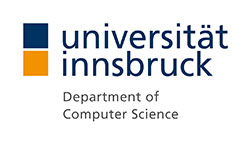We make the measurability of our R&D results one of our primary tasks. We want to show to the world that semantic technologies are becoming reality. Find out more about our results and our spin-off companies.
Downloads
Design-Time Process Mediation Plug-in Website: http://www.wsmx.org
The Process Mediation Design-Time Tool allows a business analyst to identify and to solve the heterogeneity problems that may appear between various business processes. The result of the process mediation is a new process able to interact with the processes it mediates between and to coordinate their execution. |
ELLY Website: http://sourceforge.net/projects/elly
ELLY is a reasoner for entailment and satisfiability checking of ELP rule bases. |
IRIS Website: http://www.iris-reasoner.org/
IRIS (short for Integrated Rule Inference System) aims to be a framework consisting of a collection of components which cover various aspects of reasoning with formally represented knowledge. Currently, IRIS is an engine for safe Datalog programs with negation, built-in predicates and an extended set of data types. |
MINS Website: http://tools.sti-innsbruck.at/mins/
MINS is a reasoner for Datalog programs with negation and function symbols and supports the Well-Founded Semantics. The acronym MINS stands for Mins Is Not Silri, it is based on the SILRI inference engine by Stephan Decker and Jürgen Angele. MINS is available under the GPL license. |
ONTOCOM Website: http://ontocom.sti-innsbruck.at
ONTOCOM is a cost estimation model for the area of Ontology Engineering, whose goal is to predict the costs (expressed in person months) arising in typical classes of ontology engineering processes such as ontology building, reuse or maintenance. |
Ontology Mapping Tool Website: http://wsmt.sourceforge.net
The Ontology Mapping Tool (OMT) is an Eclipse plug-in part of the Web Service Modeling Toolkit (WSMT), designed to offer support for the semi-automatic creation of ontology mappings. OMT offers a set of features such as multiple ontology perspectives, mapping contexts, suggestions, bottom-up and top-down mapping strategies, etc. |
RDF-AI Website: http://code.google.com/p/rdfai/
RDF-AI is a tool for alignment, fusion and interlinking of RDF datasets. |
RDFSReasonerThe RDFS Reasoner translates ontology descriptions in RDFS to predicates and rules. It is using IRIS as an underlying reasoning engine and currently supports the simple, RDF, RDFS and extensional RDFS (eRDFS) entailment regimes. The implementation is based on the work described in |
RDFXSLTRDFXSLT is a package that simplifies using XSLT and XPath to process arbitrary RDF/XML data. The first part of RDFXSLT is a stylesheet that preprocesses the incoming RDF/XML data so that the RDF statements are captured in a predictable way, independent of the structure of the original RDF data — in a so-called "flattened" form. |
Semantify.it Website: semantify.it
Semantify.it is a free of charge software-as-a-service platform to bring the vocabulary of schema.org to your website. Back in the day, creating websites was a struggle for laymen so content management systems were invented. Today, annotating with schema.org is a struggle, so we bring you semantify.it. |
Sparkwave Website: http://sparkwave.sti2.at/
Sparkwave is a solution for continuous pattern matching over RDF data streams. It is based on the Rete algorithm, which allows efficient and truly continuous processing of streamed data. |
tsc++ Website: http://tsc.sti2.at
tsc++ is an implementation of the TSC communication and coordination paradigm for the Service Web and large scale Semantic Web and Semantic Web services installations. tsc++ was originally based on the FIT-IT |
Web Service Modeling Toolkit (WSMT) Website: http://wsmt.sourceforge.net
The Web Services Modeling Toolkit (WSMT) is an Integrated Development Environment (IDE) for Semantic Web Services developed for the Eclipse framework. The WSMT aims to aid developers of Semantic Web Services through the WSMO paradigm, by providing a seamless set of tools to improve their productivity. |
WSML2ReasonerThe WSML2Reasoner framework is a modular architecture that combines various validation, normalization and transformation algortihms to translate ontology descriptions in WSML to the appropriate syntax of several underlying reasoning engines. WSML2Reasoner translates ontology description in WSML to datalog predicates and rules. |
WSMO4J Website: http://wsmo4j.sourceforge.net/
WSMO4J is a Java-based API and a reference implementation for building |
WSMX CoreWeb Services Execution Environment (WSMX) is a sample implementation of an execution enviroment for the Web Services Modeling Ontology (WSMO). WSMX Core is a release of the compiled core of WSMX, which act as a platform for and a manager of the individual components of WSMX that achieve the desired overall functionality. |
WSMX Data Mediation Component (Instance Transformation)The Instance Transformation Engine for Data Mediation is a run-time engine capable of performing instance transformation for given pairs of ontologies based on a given set of mappings. These mappings are represented as statements in the Ontology Alignment Format which assures the ontology representation language neutrality. |
WSMX Keyword Based Discovery ComponentWithin WSMX a keyword based engine has been developed that operates over WSML files. This engine is part of the standard WSMX distribution and is distributed under an LGPL license. |
WSMX Lightweight DL Based Discovery Component Website: http://wiki.wsmx.org
Within WSMX a lightweight Description Logic (DL) discovery engine has been developed that operates over WSML files. This engine is part of the standard WSMX distribution and is distributed under an LGPL license. |
WSMX Lightweight Rule Based Discovery Component Website: http://wiki.wsmx.org
Within WSMX a lightweight rule discovery engine has been developed |
WSMX Ranking Component Website: http://wiki.wsmx.org
The WSMX ranking component prototype provides the following functionality: |
Contact person in charge.

